Wow & Flutter 002 | All Energy Must Continue Upward
Andrew Horton on Good Glass Records, American public realism, pop melodies, and the Chicago of the early 2000s.
Dispatch 002 is a little personal. I became an adult with Andrew. Sometimes in close proximity— living on the same block in Chicago in our twenties, walking down to Laurie’s Planet of Sound in Lincoln Square. Sometimes in distant pandemic texts as working parents trying to find childcare when we both relocated to the East Coast. Andrew was my first internet troll, in the late 1990s on a small message board comprised of mostly questioning evangelical kids who had found the Cornerstone Festival. We listened to Luxury and Danielson, made our friends burnt CDs and mixtapes. Later, as the hidden and celebrated work of Fred Thomas makes an appearance in this interview— we had standard coming of age questions like— are you kissing anyone? Here in midlife is Andrew Horton, with a brief history of everything.
W&F: Hi Andrew, how's it going on this long weekend? I know you work full time in public health IT, carry a mix and mastering client load that includes Aquarium Drunkard, head Good Glass Records, and perform live as Holy Love Incorporated—what's getting most of your attention this week? It's okay if yard work is the answer. Actually, I wish you would answer "long naps".
Andrew: A long nap sounds great, but I also have an adventurous six-year-old so I can't remember the last time I got one of those. On a long weekend, I really like doing something that feels like I went "somewhere else" and got a change of scenery, so in this case it's making the hour or so drive up to the Eastern Shore of Virginia and exploring wetlands, driftwood, tide pools, stuff like that. I grew up in the Mid-Atlantic and my family goes back generations here; it's in my blood. This weekend we're also going to look for Chessie, the local cryptid - the Loch Ness Monster of the Chesapeake Bay. My daughter has gotten obsessed.
W&F: You and I know one another from a late 1990s message board called The Vagrant Cafe, and later we became real life neighbors in Chicago for several years. Let's talk about those Wednesday night noise shows with your Doepfer setup in the early 2000s. Take me back to the Midwest of our twenties.
Andrew: It's so funny, because I'm actually writing a memoir right now that focuses heavily on that time! I was inspired by Jessica Hopper's Night Moves which, when I read it, just felt exactly like my - and by extension, our shared time in Chicago in the 00's. Everyone feels like that time when they lived in a cool city and did cool things in their early twenties was the halcyon era, but looking backwards over the curve of late capitalism, it really feels like the last time it was possible to actually live cheaply in a world class city with a lot of amazing things going on. I moved to Chicago from D.C. and I cut my rent literally in half for an apartment that was twice the size, and then immediately spent the next decade in a life changing blur of music, art, film, comics, shows, and experiences. I had to learn to be cool real quick, because I'd go to a show or a film screening or a book event and half of the audience would be other creators that I thought were like, "superstars" - you'd look over and see Steve Albini, or Chris Ware, some absolute titan of their craft just standing next to you. And I could do all this working at a coffee shop or temp jobs, no trust fund or safety net. I literally built my big Synthesizers.com modular one module at a time off of barista tip money. Just writing this, I feel like we need an "Ok Boomer"style slur for us Gen-X'ers who caught the last opportunity to live like this. What a world.
Chicago, and the rest of the Midwest in the 00's was a hotbed of good experimental music. You had the long tail of the Tortoise, Drag City, Thrill Jockey stuff, but also Hefty Records, Telefon Tel Aviv, that whole world. We were also geographically close to the Michigan noise world, so you'd also get all the Wolf Eyes / American Tapes and adjacent stuff like Fag Tapes, then the Ohio contingent of Emeralds, Hanson Records, etc. coming through on tour regularly. You also had homegrown Chicago upstarts like Brett Naucke and his Catholic Tapes label and international mutant superstar Beau Wanzer, who I'd run into in line at the coffee shop and talk Roland with. And then of course Chicago just being an international nexus of music and culture, Wire Fest at the Empty Bottle, etc. - I get dizzy just remembering it all.
What I remember was all of the opportunities to just get out and play, so I did. I joined my friend Jason's dark ambient/noise project Anaphylaxis and pushed us in a more Popol Vuh/Tangerine Dream direction with loping Berlin School sequences. I started a synthpop band with my ex called Prairie Primitives, then a more post-punky one called FM Towns. I did a solo modular/dub thing called Engine Beach, just trying to be Excepter by way of like, Final Fantasy soundtracks. I made House music. I built handmade circuits and performed playing those, having to resolder connections mid-set. I had a colossal amount of fun.
When I started playing Chicago shows in 2004 I was the only person with a modular synthesizer and by the time I left in 2016 I was sick of shows where everyone was playing modulars - talk about a snapshot of an era.
W&F: We often talk about "1990s Nickelodeon aesthetic", particularly niche things like the Chocky opening credits, and early PBS like 3-2-1 Contact. I reference a lot of what you put out at Good Glass as "latchkey kid poetics". Enter Good Glass 005- All Energy Must Continue Upward, I see a lot of who you are in this tape and I see why you pressed it. Tell me about that.
Andrew: I love "latchkey kid poetics." Another term I've used is "American Public Realism," thinking about that early PBS/Sesame Workshop/EPCOT childhood feeling. There's been a lot of talk about this idea of "Hauntology," loosely defined these days as nostalgia for a future that was promised but never arrived, although the academic origins go much deeper (read Mark Fisher, etc.). In electronic music terms that's generally just turned into "Boards of Canada as a genre," aka warbly synths and tape hiss. I think that there's something deeper to dig into there, though, especially from an American perspective. We didn't grow up with Doctor Who and public information films telling us to not play in the leftover bomb craters, we grew up with 3-2-1 Contact and like, Time Life Mysteries of the Unknown commercials. If our British cousins heard jungle playing on pirate radio, we got it via Playstation game soundtracks. I think Ghost Box is one of the greatest record labels out there - and a huge influence on Good Glass - but I also cringe when I see Americans working in this space name themselves like "Thistle and Partridge" and try to do their take on nostalgic BBC stuff. Leave that to the people who lived it! I want to know what the hauntology of growing up in rust belt Ohio, watching Tron on Betamax, and hearing Laura Branigan's "Self Control" over AM radio feels like. I feel like nobody's telling that story yet. That's loosely why I started Good Glass, although the mission and the vision continue to mutate, as they should.
W&F: I feel like Fred Thomas is the perfect blend of upper Midwest meets latchkey kid poetics, how did you meet and decide to work together?
Andrew: Fred's music has always struck these feelings in me. His band Saturday Looks Good To Me was like a time machine back to the Detroit Girl Group vibe, and so much of his recorded output feels like a man out of time, from the general sensibility to the production and arrangements - while always feeling very handmade and close to the bone.
It's funny, because Fred and I were talking a while back and we can't figure out when/how we initially met! Fred is from Ypsilanti/Ann Arbor/Detroit, and is an absolute lifer in music, so he came through Chicago regularly on everything from small shows to national tours, like with Nomo or Calvin Johnson's Hive Dwellers. Who knows. I've loved his music since his involvement with His Name is Alive and Saturday Looks Good to Me. Not long before I started Good Glass, Fred came through Norfolk, Virginia on tour with Anna Burch, and we had a great hangout and and just kind of jawed about music and all sorts of things.
When I started the label, I actually had the idea that it would be interesting to release some "demixed" synth parts from his incredible album Aftering - kind of his his Low - and he revealed that he had actually been working on a bunch of intentionally synthesizer-based stuff for a while and had been looking for a way to release it. Jackpot!
W&F: Synthesizer-centric music can be a challenging listen for those who may not come from that background-- what makes a composition good in your opinion? I don't want to use the term listenable, but we are going to say it. I feel like Fred managed to churn out a highly listenable album of homemade electronic music.
Andrew: Art is subjective, blah blah blah, but for me it always comes back to melody. All music is pop music. There's hooks in Autechre, Xenakis, and Stockhausen. Richard D. James is the greatest living composer, a once-in-a-century talent who just happens to be working in the contemporary style of "electronic dance music" just like Mozart wrote minuets for social dancing, but at the end of the day you can take "Xtal" or "Avril 14th" or even like, "Vordhobsn" and play it on a toy piano and it's beautiful. You'll be humming those melodies for the rest of your life. I think synthesizer timbres can be a challenge for some people, but a good melody - there's a reason anyone can hum "Axel F" or Vangelis's Chariots of Fire theme. Fred writes great melodies, always has, so switching up his tools to the electronic world - he's still going to make good and interesting melodies.
W&F: What's your favorite track on All Energy Must Continue Upwards?
Andrew: "Child of Forever," the final track. I laughed out loud the first time I heard it - in sheer delight and surprise. I didn't expect blistering drum-n-bass. it's so melodic and joyful, too, it's almost like happy hardcore - great little melodic riff that worms its way in and then chopped breaks spraying everywhere, hallelujah. I love the audacity. One of the things I love about this record is that it's all over the place so it feels like a great mixtape, but still feels like it's from one mind. "Child of forever" is the surprise track you throw on the mixtape, the left hook, the curveball.
W&F: When you're wearing your label head cap, how do you let your artists work? Are they submitting WIPs to you, do you give them full creative control without check-ins?
Andrew: I work with people who I trust implicitly - it's their vision, full stop. I've released people who are decades deep into their careers like Fred Thomas or Ronnie Martin (of Joy Electric), and people who are putting out their first record, like Smbols or Hope Magnet. I'm always glad to provide feedback and talk shop on mixes, song order, stuff like that. The first Smbols album had a completely different song order and some different mixes and I gave some thoughts and advice that were ultimately reflected in the final version we released, but ultimately Sam/Smbols had final cut on everything. I just want people to feel good about what they're doing and the final incarnation.
W&F: You continue to release cassettes-- do you think cassettes are here to stay? I've been interested in the resurgence of cassette culture, an example would be the We Are Rewind tape players.
Andrew: I love cassettes. As a kid from the eighties, I always will. I buy a ton of cassettes from other labels. My friend Mark Masters just released an awesome book about the history of the cassette (High Bias) and I just watched him get interviewed on CBS News about it, so I think tape culture is here to stay. I'd love to see a resurgence of machines - We Are Rewind is a great start. But also, there are still a gazillion working decks out there in every thrift store, so from an environmental impact and reuse perspective, maybe we should all just keep foraging. What there is a real lack of are higher quality machines. I use a Denon broadcast deck in my studio, and it has three heads and varispeed and all sorts of goodies that you won't find in a Fisher deck at a thrift store.
I also think that the tapes are in many ways just a totem, or talisman, or fetish object connected to the music and that's totally ok. I don't care if someone buys our releases and never listens to the actual cassette and instead just listens to the digital on Bandcamp. I think there's value in the physical. I'm open to even releasing things that aren't playable media as the canonical "physical incarnation" of a release. Imagine an album where it's available as digital or "Candle plus download." What if the canonical physical release is like a statue, or a zine, or a paper lantern, or a fragrance!? We want physical fetish objects connected to this ethereal "content" that we love. Let's get weird with it!
W&F: Thanks for chatting with me-- if you head to your local book, tape, and record store this weekend-- what are you going to look for?
Andrew: I'm going to cheat on this one, because I just got it in the mail already, but it's the new MIDI Janitor tape Holy To Dogs.
out on Hotham Sound. Not only is a great record that I wish I had released, but it's got a cool/weird story behind it. Sometimes it's hard to "tell stories" with instrumental electronic music - the art, song titles, liner notes etc. have to do the heavy lifting. It's not a narrative dense medium. My favorite thing, then, is when something in this space is clearly telling a whole story that hooks me and draws me in.➿
—
Go get a tape:
All Energy Must Continue Upward
7 copies left, via Good Glass Records




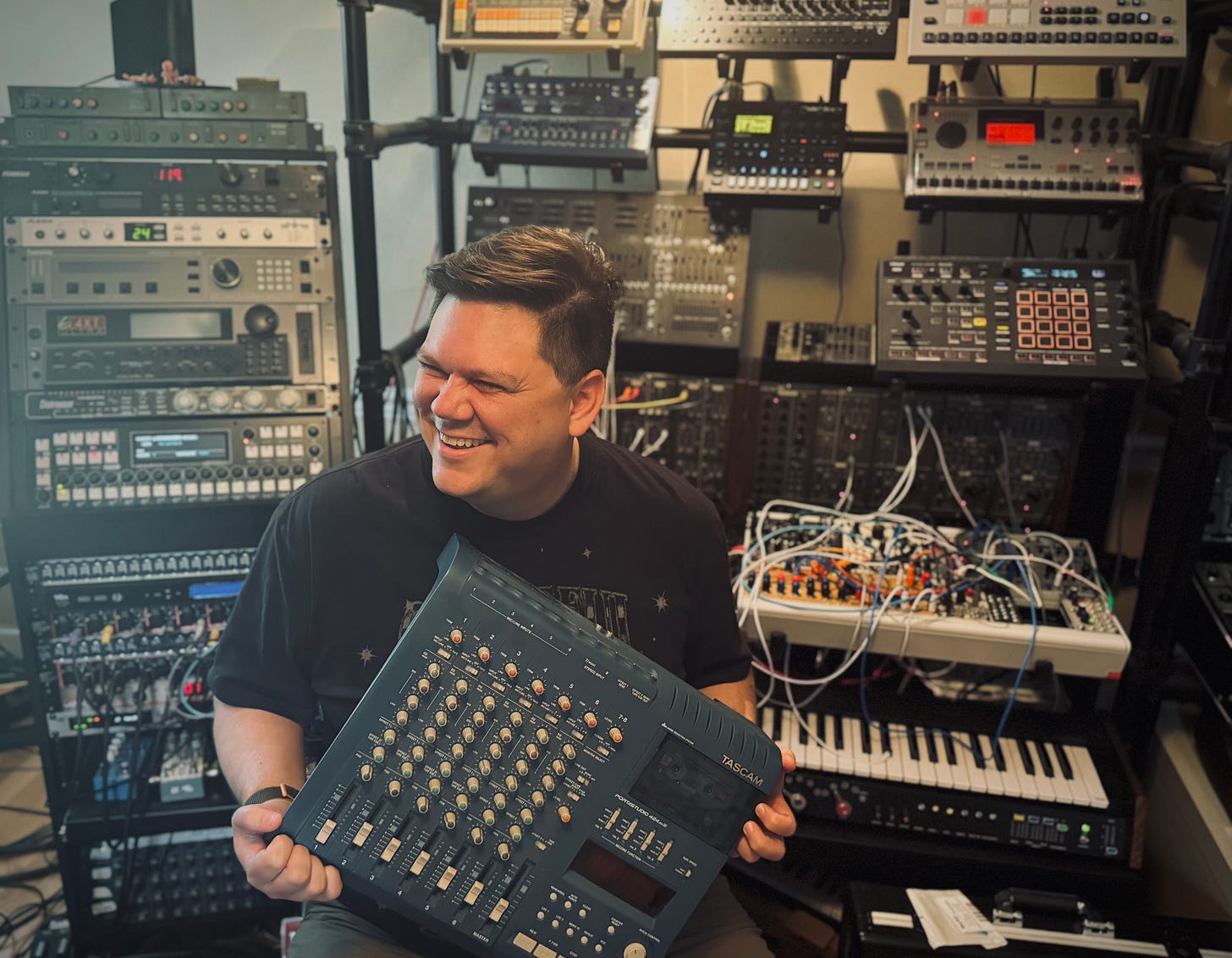
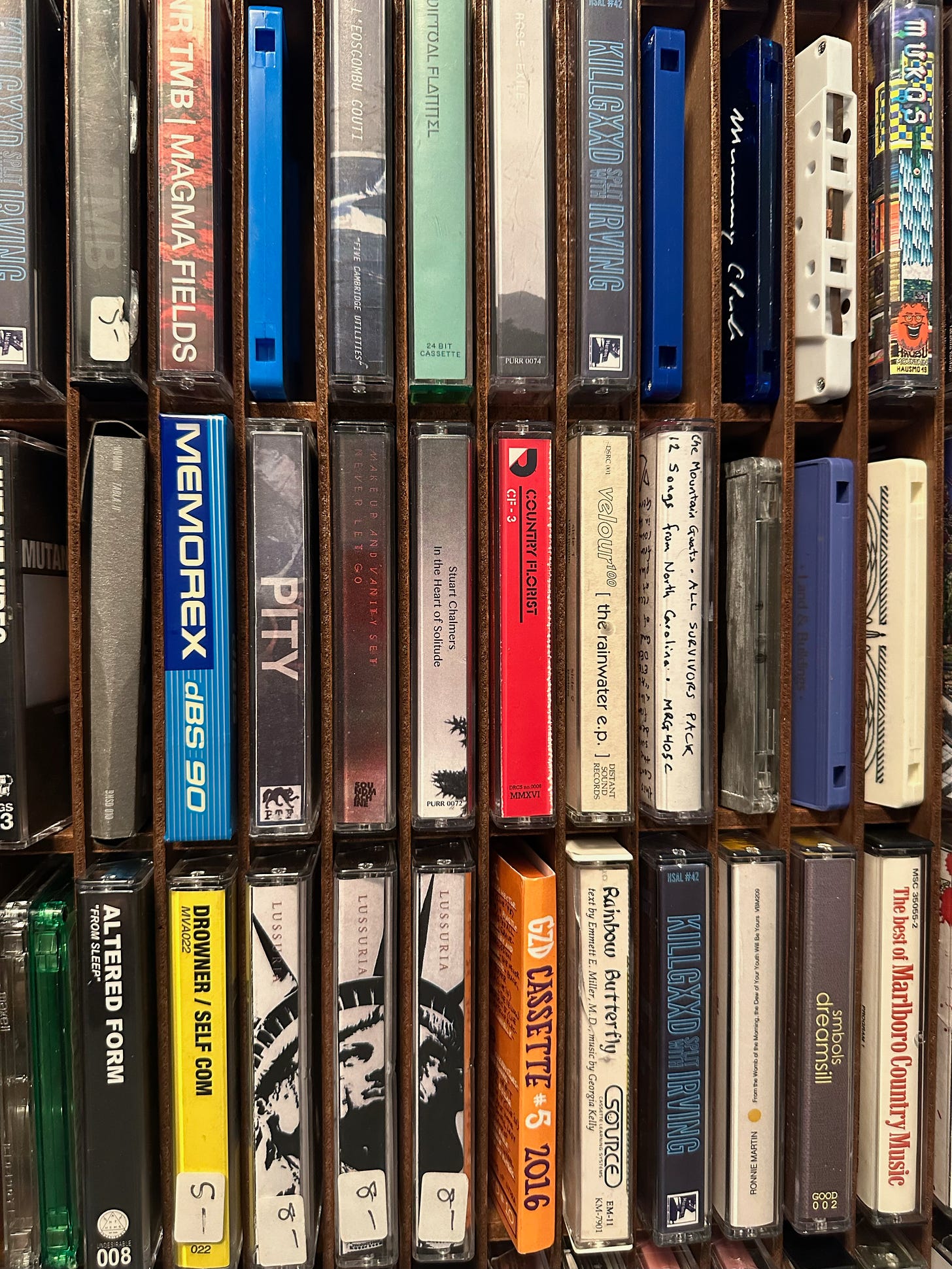
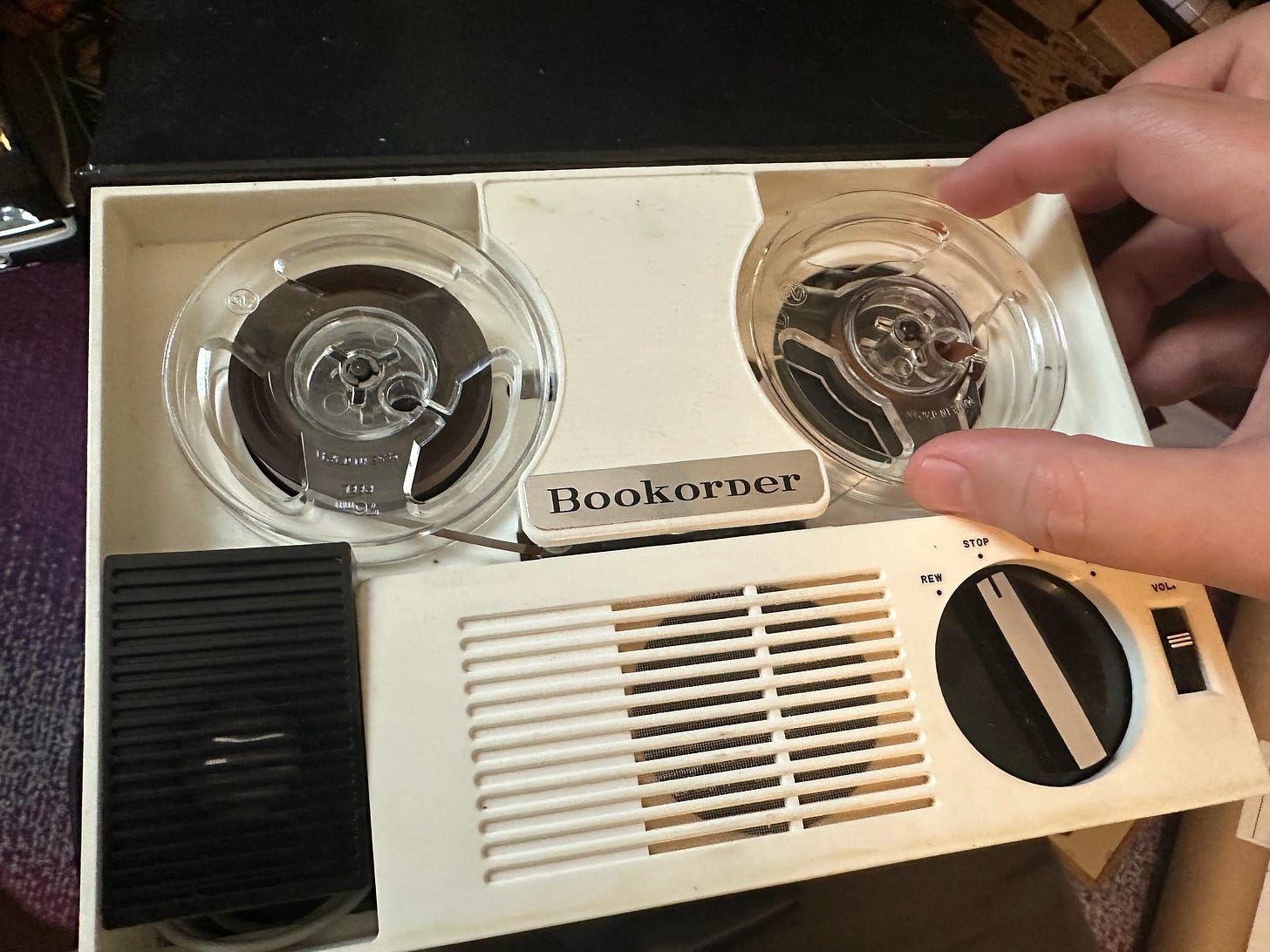
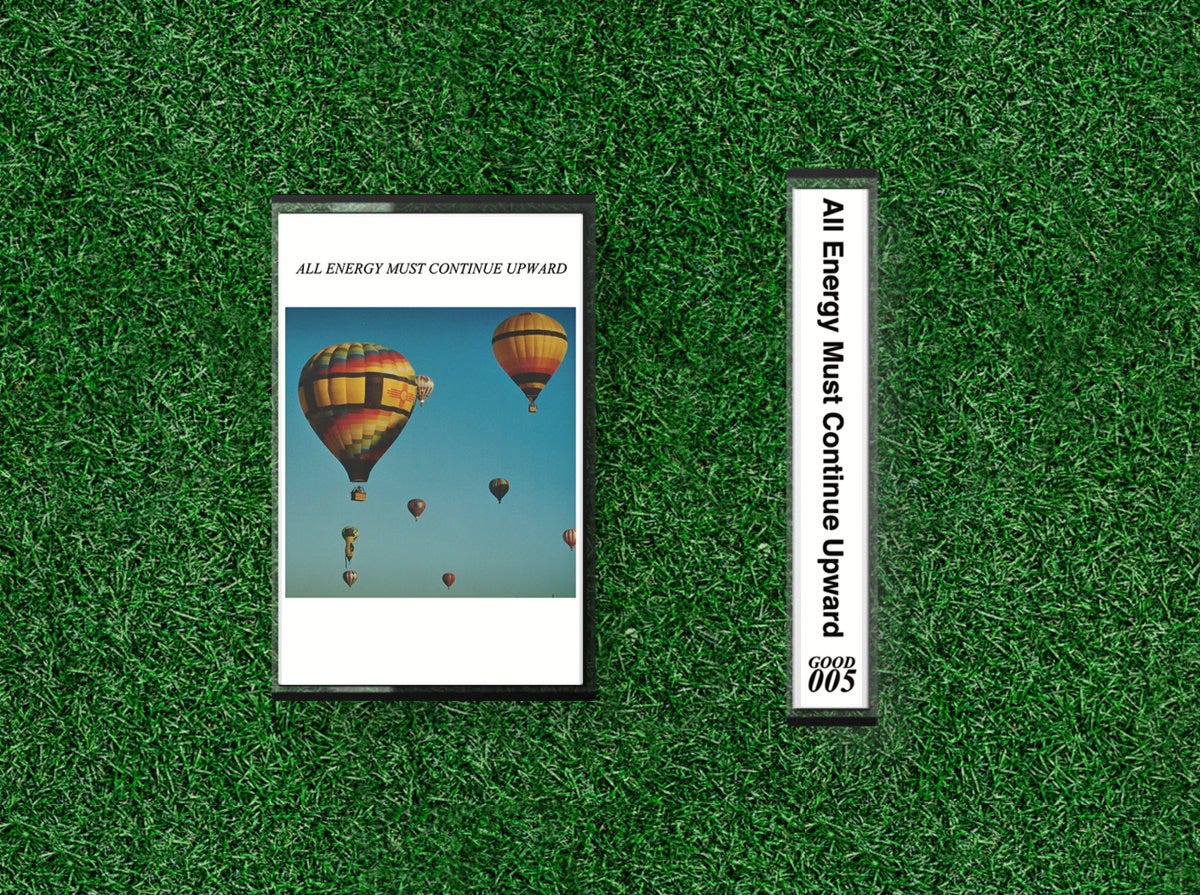
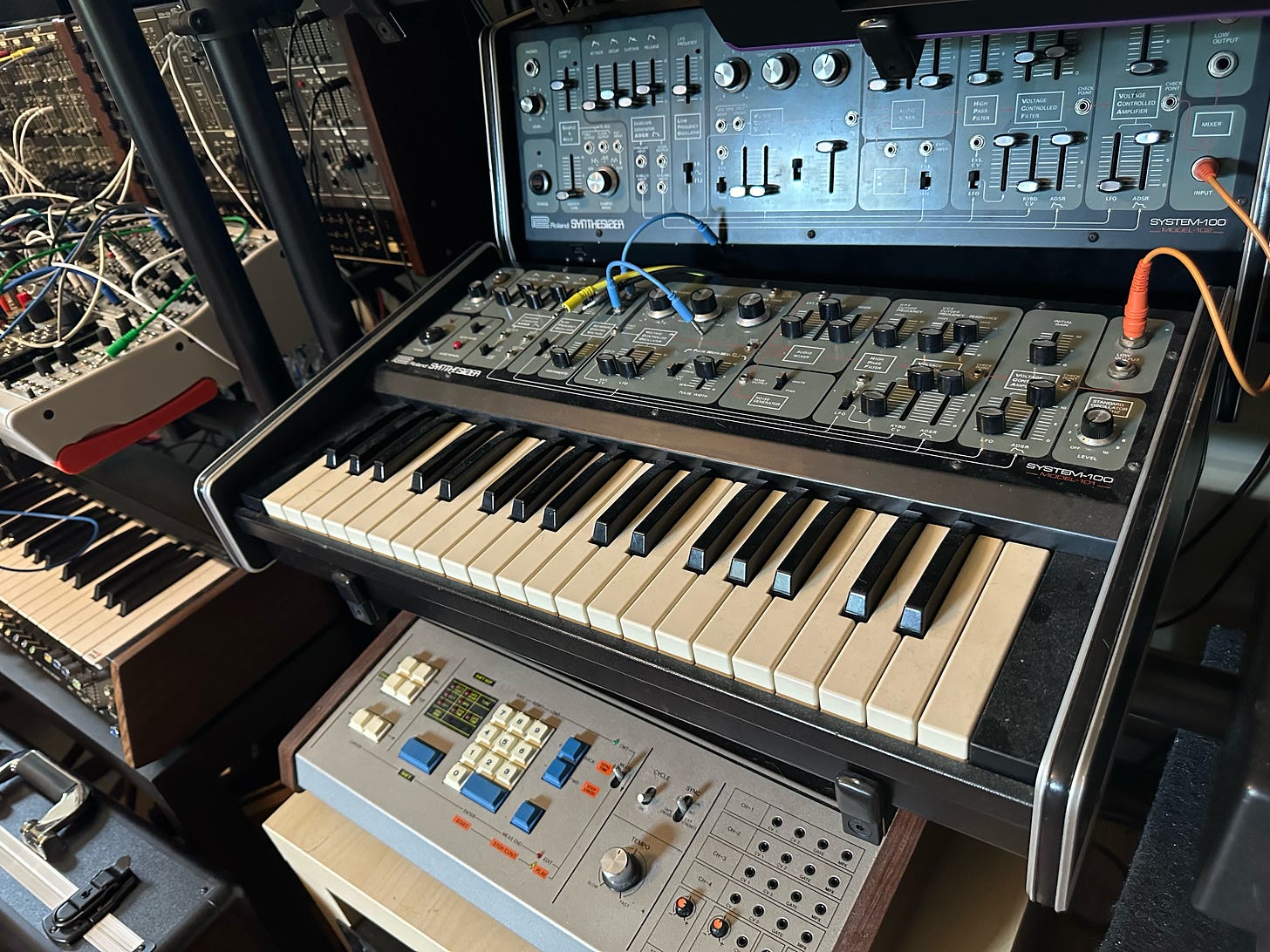
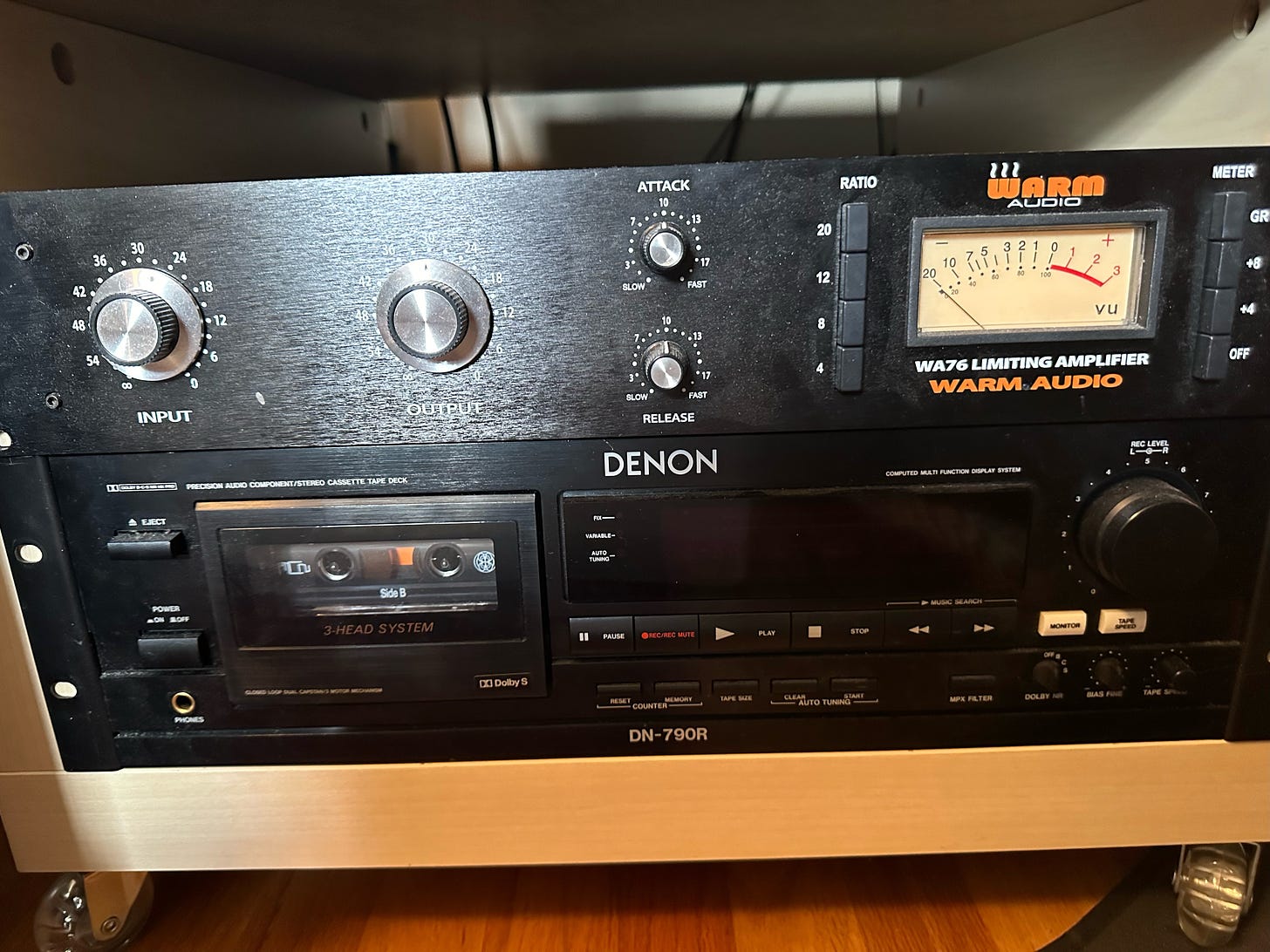
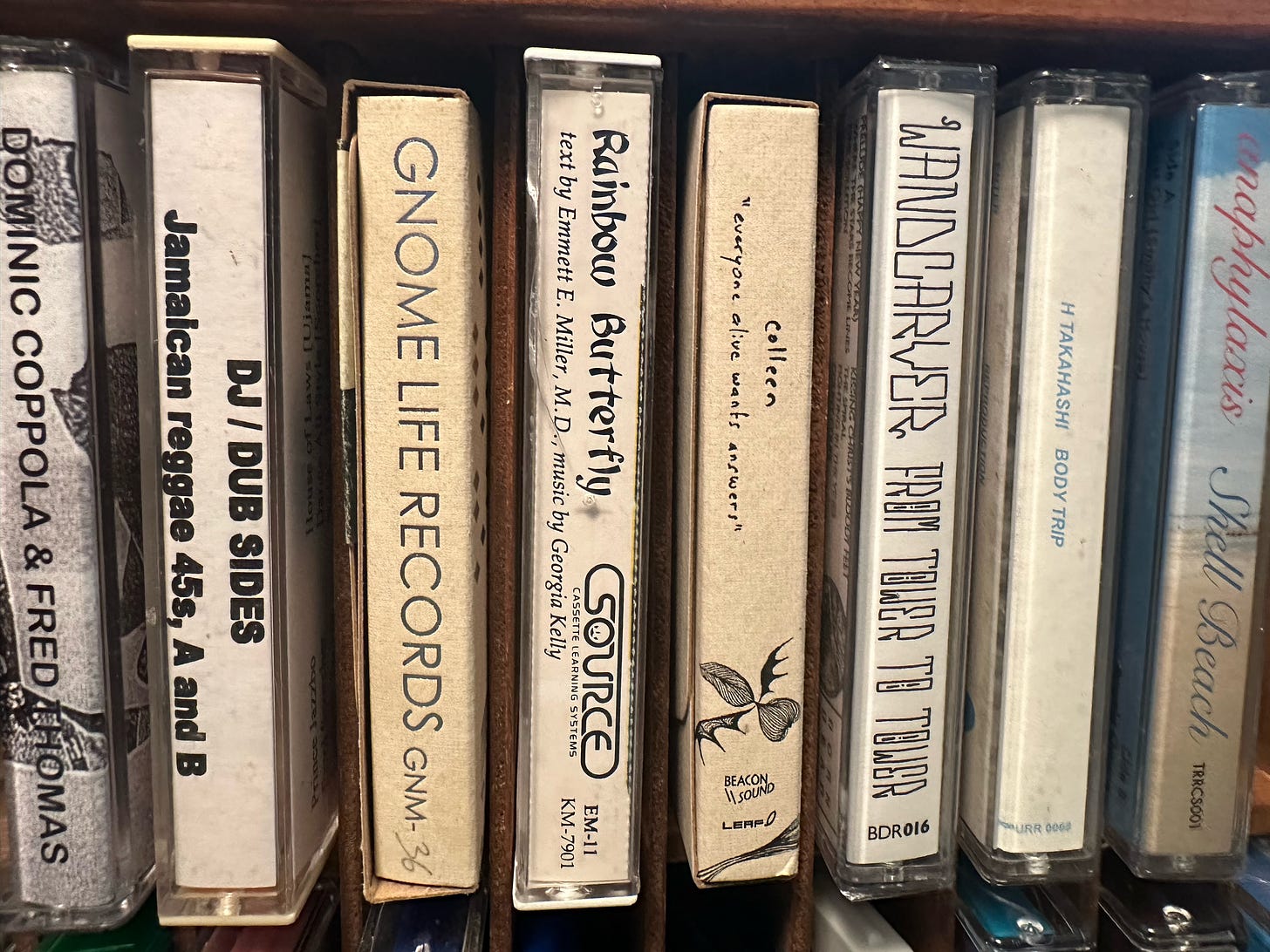
I discovered this article when MIDI Janitor posted about it and I am so glad I did. I need to read and re-read this article about 20 times. I resonate with everything you said and it makes me so happy. Now I need to go research beginner synths with keyboards and then go to Guitar Center to get one and a used Tascam Portastudio. I have absolutely no idea how they work but I need to get them. And yes I got a We Are Rewind player during get Kickstarter campaign, but need to somehow find a used three-head deck. Anyway, thanks again for writing this, it put a huge smile on my face!